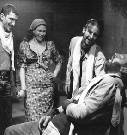|
|
||||
|
|
by Donald Levit  Moustafa Zekri’s screenplay for Fallen Angels Paradise is loosely adapted from Jorge Amado’s Doña Flor and Her Two Husbands, also the starting point for the 1978 Brazilian film of that name. With its mordant humor, somber brown-and-white color scheme, apocalyptic vision of a deserted nocturnal city -- here, Cairo, “a city of nowhere” -- condemnation of joyless capitalism, and lurking threatened violence, director Ossama Fawzi’s film calls to mind Jean-Pierre Jeunet’s 1991 Delicatessen. Its possible sources aside, the Egyptian film, lauded by audiences at the 1999 Cannes and African Diaspora Festivals and the cause of polemic and scandal in Fawzi’s native country, is a remarkable and unique production in its own right, hilarious and horrifying at the same time. It opens with gambling -- perhaps for souls -- drunkenness, overdose death and whoring, and never relents until the dénouement, a final descent into modern caves of Avernus and hell as couples and a cadaver kiss, drink ferociously and laugh hysterically in a pickup truck with falling-off doors that weaves down a nightmare Ahmed Hamdi Tunnel. The title’s fallen angels, street toughs Nonna, Adel and Boussy, are played by wealthy Overriding her mother and fat, bland husband, whom Rasmi had hated and nicknamed “stuffed pork,” mini-skirted, chain-smoking daughter Salwa bribes a doctor for a respectable death certificate and claims her father’s body. Following close-ups of the body’s being handwashed above photos of Salwa, the conservatively suited and clean-shaved cadaver is waked in the family mansion. As the bourgeois Buñuelesque family squabble in an adjacent parlor, his three fallen angel friends come to give the dead man a live toad and some whiskey, steal what they can and carry the body off with them for a final debauch. The bare plotline of Paradise of Fallen Angels does not begin to tell the story. The film goes stylishly beyond its avowed intention of “showing that the gap between wealth and poverty is bigger than the one between life and death” and visualizing that “anarachy, chaos, reality . . . where the fallen angels create their own paradise.” The talent and vision of Fawzi and his staff are what carry this film beyond a simple elaborate joke, for although there are both shock and abundant (black) humor, e.g., the surrealistic “life” of its own displayed by the dead body, what ultimately emerges is the desperation and persistence of life, that fact that death itself is a state of mind which, in the will or memory of the living, can be endowed with new and continued presence. For the ambitious but cash-strapped Egyptian cinema industry, which produces some sixty features a year, Fallen Angels Paradise represents a major if controversial and costly move upwards. For this North African film -- “shoestring” by Western standards -- expensive sets had to be built, consultants called in, “specific electrical installations” approved and secured, and new camera mounting techniques developed. Director Fawzi has obviously made a conscious effort to introduce modern themes as well as improved technology to his country’s cinema. In this his second feature -- The Asphalt Devils received a Special Jury Award at the 1996 Locarno Festival -- he has taken an important step in that desired direction. Unsettling, yes, and bizarre, Fallen Angels Paradise is a serious and provocative movie. Viewers will not leave it untouched. What one sees may not be pleasant, but it is unadorned and true. (Released by ArtMattan Productions; not rated by MPAA.) |
||
|
© 2024 - ReelTalk Movie Reviews Website designed by Dot Pitch Studios, LLC |



